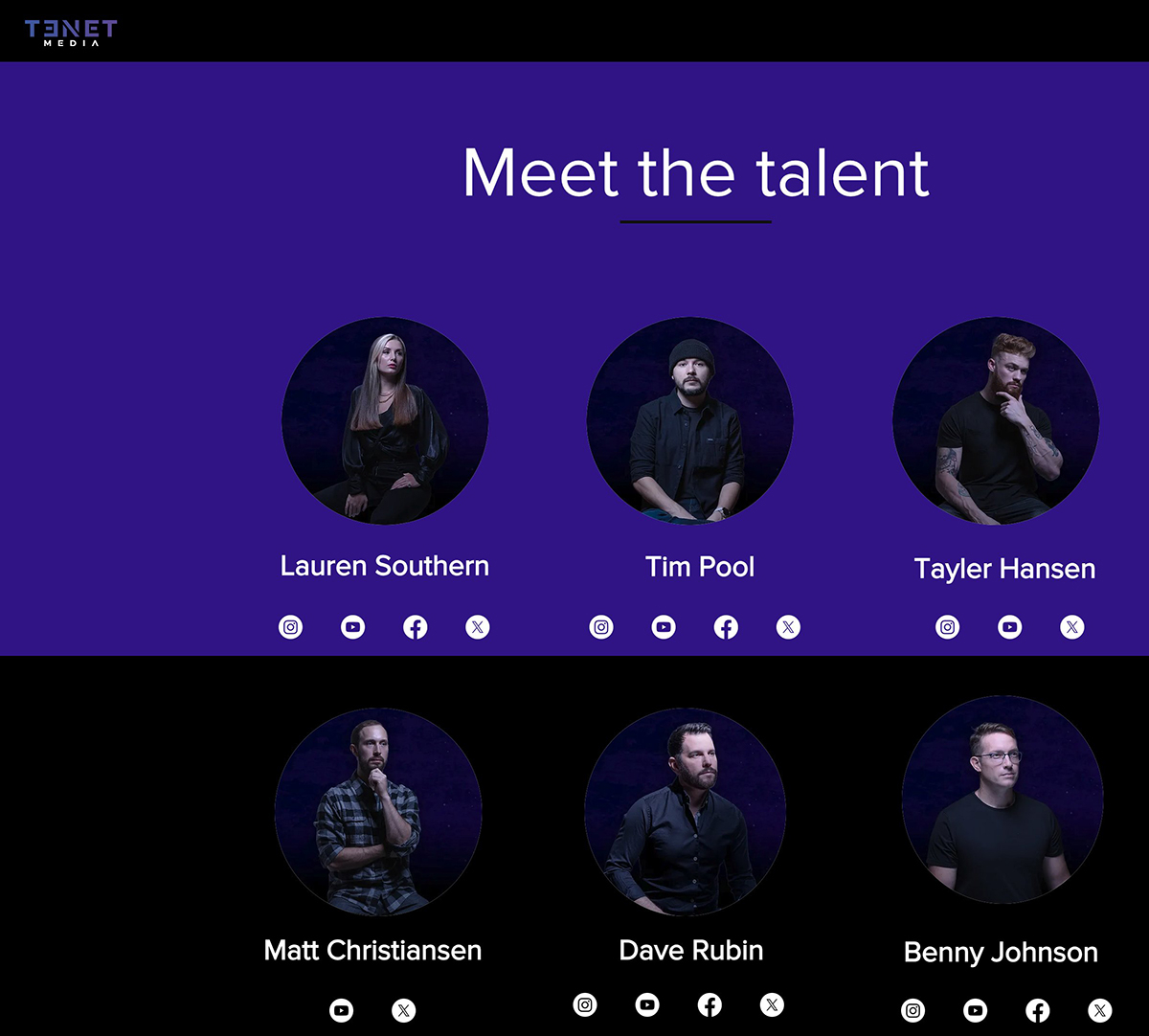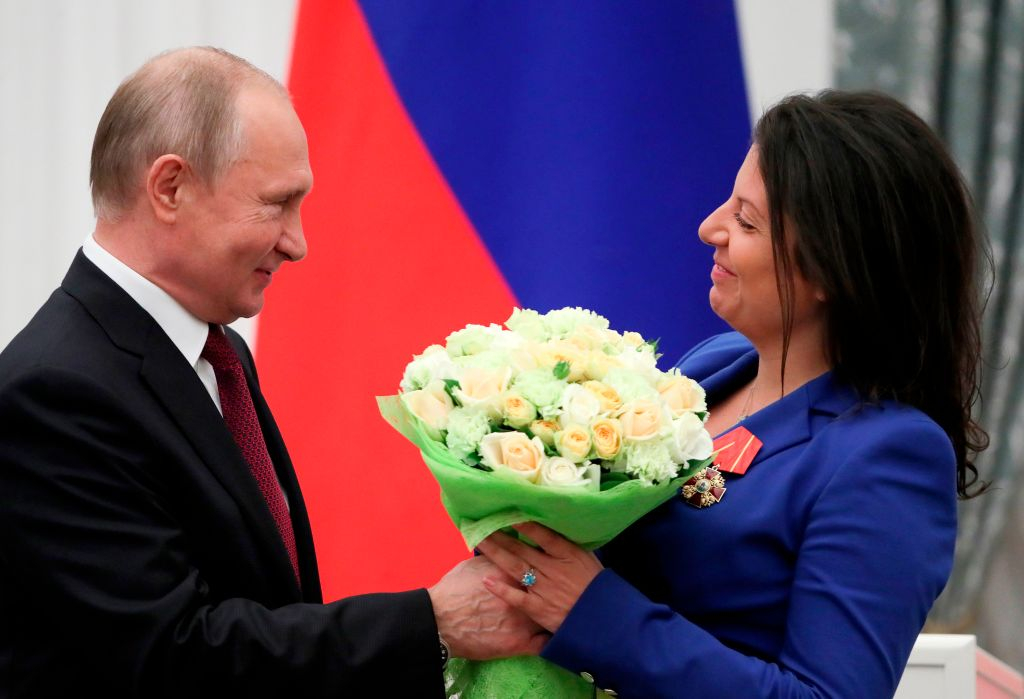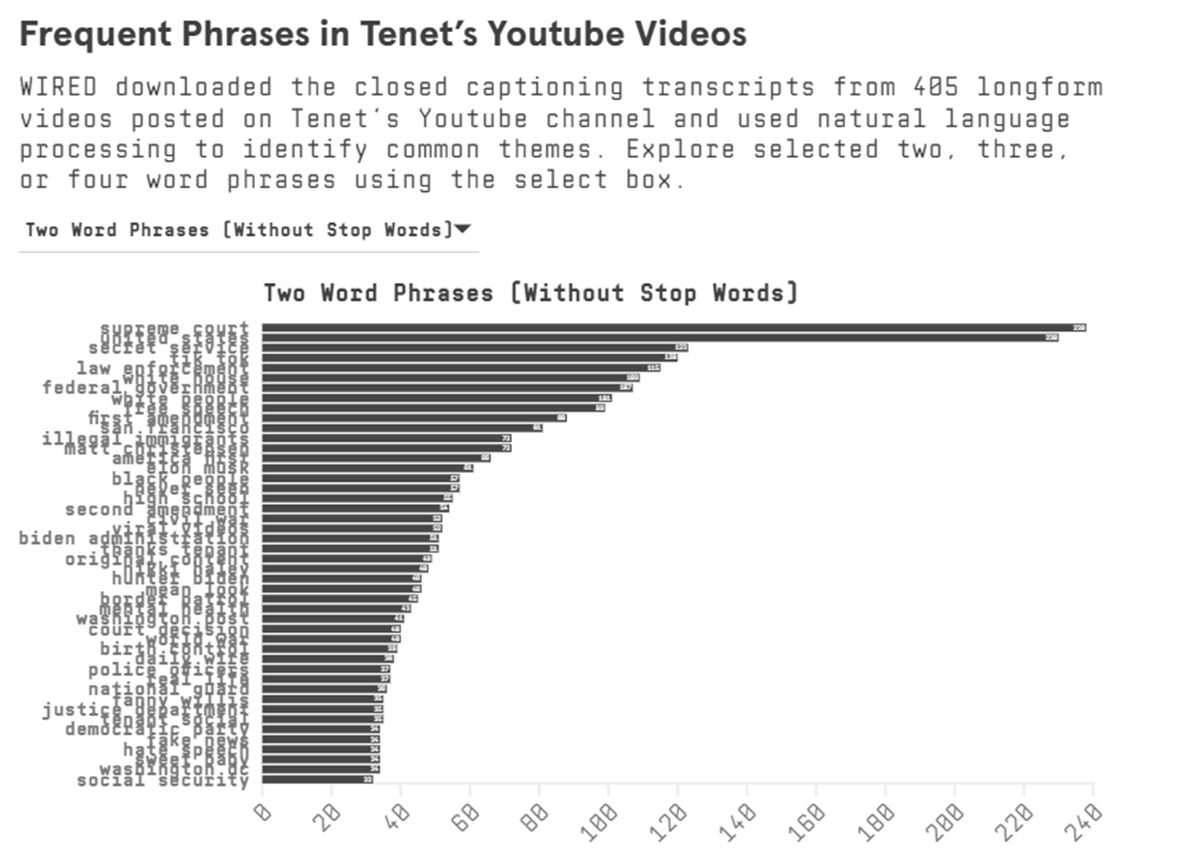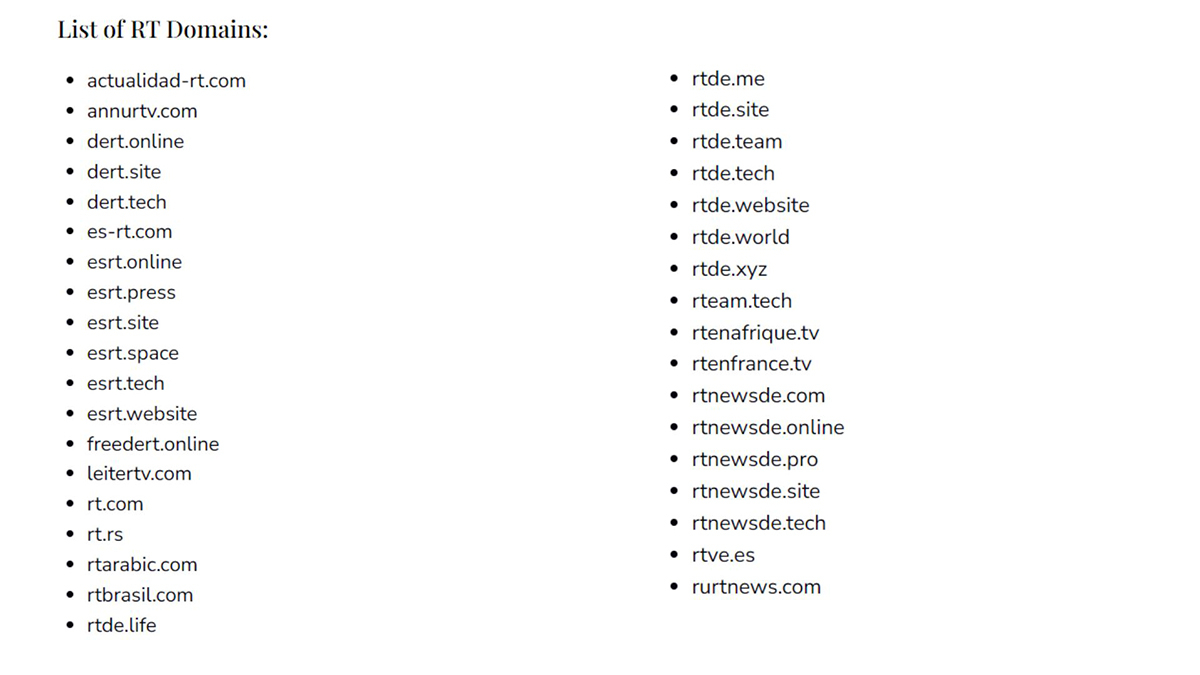Українською читайте тут.
Bribing bloggers, fake domains, and other ways the Russian propaganda resource circumvents sanctions.
In September, the U.S. Department of Justice revealed that at least six prominent American bloggers were secretly funded by Russian state media to promote Moscow’s interests in the United States.
Later, U.S. Secretary of State Antony Blinken stated that Russian media outlets, including RT (formerly Russia Today), were "functioning like a de facto arm of Russia's intelligence apparatus." In response, the U.S. Treasury imposed sanctions on the media group Rossiya Segodnya and its subsidiaries, including RIA Novosti, RT, Ruptly, and Sputnik, as well as the hacking group RaHDit. The sanctions were imposed partly due to Kremlin-linked entities interfering in the 2024 U.S. presidential election.
Among those targeted by the sanctions are RT’s Editor-in-Chief Margarita Simonyan, her deputies Elizaveta Brodskaya and Anton Anisimov, Deputy Director of English Broadcasting Andrei Kiyashko, Digital Media Projects Manager Konstantin Kalashnikov, and his subordinate Elena Afanasyeva. Despite these measures, Simonyan dismissed the accusations, claiming that RT will continue its operations despite the sanctions.
Detector Media reveals how RT continues to work around sanctions and promote pro-Kremlin narratives in the West.
Bribing Influencers and Operating Undercover
A federal indictment by the U.S. Department of Justice alleges that from October 2023 to August 2024, an unnamed media company received approximately $9.7 million from RT, comprising nearly 90% of its total bank deposits. While the indictment does not name the company, investigative outlet Bellingcat identified it as Tenet Media, a firm established in 2022 by a married couple of far-right conservatives from Tennessee.
The funds were routed through shell companies based in Turkey, the United Arab Emirates, and Mauritius. They were often accompanied by messages falsely stating that the payments were for purchasing electronics.
According to the indictment, RT employees Konstantin Kalashnikov and Elena Afanasyeva were directly involved in Tenet Media’s operations, using aliases to conceal their identities. Kalashnikov oversaw content editing, financing, and staffing, while Afanasyeva managed video distribution, gathered information, and provided directives to staff. For instance, after the March 22, 2024, terrorist attack at the Crocus City Hall concert venue in Russia, she instructed a contributor to blame Ukraine and the U.S. despite ISIS claiming responsibility for the attack.
Since its public launch in November 2023, Tenet Media has published nearly two thousand videos, amassing over 16 million views on YouTube alone. These videos often comment on U.S. issues such as immigration, inflation, and other topics related to domestic and foreign policy. Although the views expressed in the videos are not uniform, most of them are aimed at the publicly stated goals of the Russian government and RT, which are to increase internal divisions in the United States, the US Department of Justice explains.

Bloggers cooperating with the Tenet media. Screenshot by Aric Toler
Prominent right-wing influencers in the U.S., including Dave Rubin, Lauren Southern, Tim Pool, Benny Johnson, Tayler Hansen, and Matt Christiansen, reportedly collaborated with the company. Tim Pool, in an August YouTube post to his 1.3 million subscribers, stated, “Ukraine is our enemy, being funded by the Democrats … Ukraine is the greatest threat to this nation and to the world. We should rescind all funding and financing, pull out all military support, and we should apologize to Russia.”
However, following the allegations, all the influencers denied knowingly collaborating with RT or promoting narratives directed by Russian media handlers. “Never at any point did anyone other than I have full editorial control of the show and the contents of the show are often apolitical,” Pool wrote on X (formerly Twitter) on September 5.
Meanwhile, RT Editor-in-Chief Margarita Simonyan, as reported by Al Jazeera, openly admitted to conducting an information war against the United States. “I am the head of a Russian state media outlet that is funded by the government,” she said. “I am proud that I work for my country! Write it down: all RT employees and its editor-in-chief follow only the orders from the Kremlin. Any other orders are being used as toilet paper.”

Vladimir Putin and Margarita Simonyan, Getty Images
On the show of another Russian propagandist, Vladimir Solovyov, RT Editor-in-Chief Margarita Simonyan admitted that in countries where RT was banned following Russia’s full-scale invasion of Ukraine, the media outlet has been operating covertly. “We organized a number of guerrilla projects. I won’t say whether these are the projects of which the United States is currently accusing us, or perhaps different projects — I won’t say anything, don’t know anything. I won’t testify about it under oath and I won’t report it to anyone except our supreme commander-in-chief, and he didn’t ask me these questions,” she said.
“Russian foreign propaganda cannot work without pre-existing Western prejudices,” said Seva Gunitsky, associate professor of Russian politics at the University of Toronto, in an interview with Al Jazeera. According to Gunitsky, the Kremlin’s goal isn’t to promote a specific ideological agenda but to destabilize its adversaries. “It can do that only by amplifying existing divisions, not by creating new narratives,” he explained.
Gunitsky argued that the Kremlin's use of politically right-wing bloggers demonstrates that it has identified a vulnerable and emotionally charged audience within this demographic. Issues such as anti-wokeness [a term referring to opposition to being "aware of racial bias and discrimination"] and anti-globalism — topics closely aligned with Russian President Vladimir Putin’s views — already resonate strongly with American right-wing circles.
As reported by CBC, one blogger was paid $400,000 per month for four videos, while another received $100,000. Journalists at CNN sought to trace how the money from RT was spent. According to the media, the individuals involved claimed they were unaware the funds came from the Kremlin, with all describing themselves as “victims.” CNN reached out to representatives of Tim Pool, Dave Rubin, and Benny Johnson to ask if they intended to return or donate the funds, but none responded. Pool, however, shared that his followers had urged him to return or donate the money, and he was consulting his legal team on the matter.
According to the indictment, one of the bloggers was informed that the project was funded by a man named Eduard Grigoriann. CNN reported that this blogger was Dave Rubin. When Rubin requested more information about Grigoriann, a company called Tenet provided a resume describing Grigoriann as a wealthy Brussels-based “experienced finance professional.” Rubin subsequently agreed to collaborate. However, it was later revealed that the resume — and Eduard Grigoriann himself — were fabrications by RT or its handlers.
Brandon Van Grack, a prosecutor involved in investigating Russian influence on the 2016 election, told CNN that the indictment was likely released in September to mitigate the impact of Russian propaganda on the upcoming November elections. In 2016, Van Grack said, the U.S. government was largely “caught off guard” by Russia’s covert influence campaign. This time, officials were determined not to repeat the same mistakes.
Keywords Used by American Bloggers
Journalists from Wired managed to download transcripts with closed captions from 405 full-length videos posted on the YouTube channel Tenet before they were taken down. This allowed them to compile a list of frequently used words and phrases employed by the bloggers associated with Tenet Media.

Most-used phrases on the Tenet YouTube channel. Infographic by Wired
The word “Ukraine” appears in the transcripts 67 times, about as frequently as “disinformation,” “Christianity,” and “Clinton.” This suggests that the influencers emphasized culture war topics that deepen societal divisions in videos with headlines like “Trans Widows Are a Thing and It’s Getting OUT OF HAND” and “Race Is Biological But Gender Isn't???” The word “trans” appears 152 times, and “transgender” 98 times.
Among the most common two-word phrases were “white people,” “Black people,” “civil war,” “free speech,” “Secret Service,” “illegal immigrants,” “Second Amendment,” and “Elon Musk.”
Popular three-word phrases included “World War III,” “great original content,” “Black Lives Matter,” “diversity equity inclusion,” and “Sweet Baby Inc.” The latter refers to a Canadian consulting firm specializing in diversity in video games, which became a target for right-wing cultural figures during the controversy dubbed “Gamergate 2.0.”
According to media reports, in an affidavit released in connection with the seizure of 32 domains that federal officials say were linked to a Russian propaganda campaign, the Justice Department alleges that through the so-called “Good Old USA Project,” the Russian government sought to use culture war themes to further its own goals, with the primary goal being the election of Donald Trump. According to testimonies, the campaign, which included the use of bots and interaction with influencers, was aimed in particular at “the community of American gamers, Reddit users, and image boards such as 4chan.” Among the narratives the campaign was supposed to promote was that Republicans are “victims of discrimination by people of color.”
RT Outside the U.S.
In comments to American media outlet NPR, media expert and co-founder of the American Sunlight Project, Nina Jankowicz, explained that RT’s reporting in America has largely focused on depicting “chaos” in the U.S. from the very beginning. RT has consistently highlighted social issues within the country and propagated conspiracy theories and false claims, such as those alleging President Barack Obama was not born in the U.S. or fabrications about the September 11 terrorist attacks in New York.
According to NPR, the State Department claims that RT conducts covert operations globally — from secretive media activities in Africa and Germany to election interference in Moldova. U.S. officials allege that the Kremlin has even established a cyberintelligence unit within RT.
“RT has become a clearinghouse for a set of covert operations, covert influence activities, intelligence operations de facto, in country after country after country,” NPR quotes James Rubin, head of the State Department’s Global Engagement Center, which focuses on combating foreign disinformation and propaganda.
Following the State Department's statement, Meta and TikTok banned RT and its affiliates from accessing their platforms. However, the network continues to wield significant influence in Latin America and Africa, where it broadcasts a steady stream of anti-Ukrainian, anti-imperialist, and anti-Western content.
In a report by Voice of America, analyst Kateryna Stepanenko of the Institute for the Study of War (ISW) writes that the Kremlin is currently employing “unconventional information warfare” methods, relying on an extensive network of bots, influencers, artificial intelligence, local news agencies, and social media accounts. These, she notes, are much harder to detect than RT itself, which has long been recognized as a Russian propaganda outlet.
Simultaneously, Alona Shestopalova, a researcher at the Center for Information Resilience (CIR), told Voice of America that RT tailors its misinformation to each country, making it a uniquely effective international broadcaster. “For instance, RT’s Latin American programs attack the U.S.’s reputation in the Western Hemisphere and focus on issues like corruption, creating content that at first glance seems indistinguishable from other media outlets.”
According to Shestopalova, direct Russian narratives do not resonate in many parts of the world, particularly in the EU and North America. Consequently, Russian propagandists avoid openly advocating for Russia in these regions: “You can’t just tell people how great Russia is or what an exemplary leader Putin is — you need to find narratives that benefit Russia indirectly. They employ ‘negative public diplomacy.’ Instead of explaining why people should love Russia, they focus on why they shouldn’t trust their own governments. Chinese international broadcasters, for example, still rely on strategies that highlight why China is a reliable economic partner, whereas Russian outlets, especially in Europe and North America, focus on showing why everyone else, except Russia, is bad. If everyone else is bad, perhaps Russia isn’t so terrible after all.”
Precious Chatterje-Doody, a senior lecturer in politics and international studies at the Open University (UK) offered her insights into Russian information manipulation tactics in an op-ed for The Conversation. In addition to using influencers, Russian strategists frequently resort to “flipping the script.” For instance, Moscow has repeatedly denied involvement in influence campaigns, as seen in 2018 when the UK accused the Russian state of orchestrating the Salisbury poisonings using the nerve agent Novichok. At the time, Russian politicians and media spun an elaborate web of conspiracy theories, mirroring accusations against British and U.S. intelligence agencies.
Once again employing the “flipping the script” tactic, Moscow’s ambassador to Washington, Anatoly Antonov, dismissed U.S. accusations as products of “Russophobia” — the same term Russian embassies used after the Salisbury poisonings.
Russia also strategically employs humor, with RT pioneering its use to legitimize Russia’s actions or deflect criticism.
This approach is evident in Margarita Simonyan’s sarcastic response to recent U.S. accusations, which she dismissed as American scaremongering about the “all-powerful RT.” According to Chatterje-Doody, Simonyan’s remarks exemplify how RT revels in its status as a “populist pariah.”
Russia continues to refine its methods for influencing international agendas, and there is no indication that this trend will abate anytime soon.
A Network of Fake Domains
Insight News writes that RT is cloning websites to spread Kremlin propaganda and circumvent sanctions. After EU and U.S. sanctions took effect, RT lost the ability to legally operate in several key markets. According to the report, one of RT’s primary strategies involves cloning website content and distributing it across multiple domains. These cloned websites target international audiences to influence public opinion, especially during elections and politically sensitive periods.

RT's domains. List by Insight News
RT redirects users from old addresses and "new friendly websites" to its updated domains, numbering in the dozens. These cloned sites replicate RT’s banned content and design, with slight changes to their interface or domain names, including to the RT branding, but retaining the disinformation at the core of their messaging. Despite attempts to shut it down, RT continues to saturate the digital landscape with its propaganda.
These websites are difficult to detect because they operate under various domain suffixes and new URLs, often using language-specific domains like es-rt.com (targeting Spanish speakers) and rtde.tech (targeting German speakers).
According to Insight News, RT’s cloned content focuses primarily on audiences in Spanish-, German-, and French-speaking regions. These areas are strategically significant for RT’s propaganda campaigns due to their large populations and political importance, where public opinion can influence elections and policy decisions.
RT’s Spanish-language content aggressively targets Spanish-speaking countries, including those in Latin America. The website spreads disinformation that is consistent with Russian foreign policy interests. RT operates websites such as esrt.online and actualidad-rt.com to attract the attention of Spanish speakers, promoting its narratives.
In Germany, RT operates and promotes sites like RTDE.life, RTnewsde.pro, and RTDE.website, which are pivotal platforms for spreading Kremlin propaganda in German. These sites played a role in disseminating disinformation during European Union elections and German political campaigns.
French-speaking regions are also a target for RT. Using domains such as rtenfrance.tv, RT aims to reach French-speaking audiences in Europe and Africa. These websites often mimic neutral news outlets while advancing a pro-Russian agenda.
RT’s overarching goal is to polarize audiences, sow distrust in democratic institutions, and favor political parties or candidates sympathetic to Russia. In Germany and France, RT amplifies Euroskeptic sentiment, exploits racial and immigration tensions, and supports far-right or populist parties aligned with Moscow’s geopolitical goals.
Similarly, in Spanish-speaking countries, RT content often supports narratives that undermine U.S. influence in Latin America while promoting authoritarian regimes favorable to the Kremlin.
Insight News notes that despite authorities’ efforts to limit RT’s influence, the proliferation of cloned websites makes blocking this content highly challenging. Whenever internet service providers remove or ban a domain, RT or its affiliates quickly launch a new clone site under a different name, often hosted in countries with more lenient internet content regulations. This decentralized structure allows RT to remain resilient against takedown attempts.
By focusing on major European languages, RT aims to influence key regions of political, cultural, and economic importance. This highlights the need for stronger, coordinated international actions to dismantle these cloned networks and prevent the further spread of harmful Kremlin propaganda.
Main photo by Getty Images



